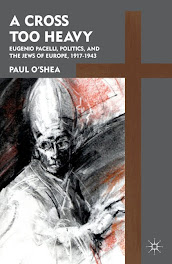ADSS 1.269 Luigi Maglione, Sec State, to Cesare Orsenigo,
Germany
Reference:
AES 2360/40
Location
and date: Vatican, 19.03.1940
Summary
statement: Maglione informs Orsenigo of his conversation with Ribbentrop.
Language:
Italian
Text:
I
take pleasure in sending Your Excellency, for your information and guidance ,
some notes on the two meetings – one in the Vatican and the other in the German
Embassy to the Holy See – which the German Foreign Minister had with me on the
11.03.1940, soon after his audience with the Holy Father (1).
The
Minister affirmed his pleasure, several times, in having been able to see the
Holy Father and to talk with him about the religious position in Germany taking
advantage of his time in Rome to settle a few questions with the Italian
Government.
He
also told me that he was able, during the audience, to note with great
satisfaction that the Pope still has his heart in Germany, and a great wish to
reach a firm and lasting agreement with Hitler.
He
added that Hitler also wants a sound and lasting settlement. He has already given proof of his goodwill by
stopping, by the hundreds, the proceedings against the clergy. But Hitler is a man with far-sighted plans
and thinks more of the future than of the present. We cannot therefore think that we can reach
the desired settlement at present.
Germany is now engaged in a terrific struggle for its own existence and
greatness. Hitler has all Germans on his side: their energy is devoted to the
attainment of victory; it is not possible to think about other problems. Afterwards we will negotiate.
I
did not fail to point out to the Minister that religion is also concerned with
the present and it is therefore not possible to set aside the current problems
which hamper it and cause sorrow, pain and grace danger to souls. Replying to one of his frequent allusions to
the so-called political activity of the German clergy, I recalled to him the
Holy See’s instructions on this subject, instructions which the German clergy,
at least generally speaking, obey scrupulously.
If in some particular instance these instructions have not been obeyed,
the only thing to do would be to inform the competent ecclesiastical authority
which would immediately remedy it. But
it would be a grave error, I added, to see political motives in the overall
activity of clergy and people.
From
here, passing to more concrete points, I recalled the particular attention of
the Minister to some of the many facts which the Church has lately been compelled
to deplore: these have already been communicated to the German Embassy to the
Holy See with our note of last July which so far has not been replied to, and
in particular other more recent notes, as for example the closing down of
Seminaries and Theological Faculties, without even informing the Holy See
although this is a matter which comes under the Concordat.
Regarding
Poland – as the Minister handed to me an official publication on the Polish
atrocities against the Germans and mentioned the political activity of the
Polish clergy – I told him that the Holy See wishes to be accurately informed
and therefore they have several times asked Berlin for permission to send a
trusted clergyman to Poland namely Monsignor Colli, Counsellor of the
Nunciature in Germany, but until now they have not had a reply in the sense
desired; and in the meantime, the various reports which circulate on the
situation in Poland, some of which cannot be confuted, are becoming very
distressing. We can ask the Polish
priests to abstain from creating difficulties to the occupying authority, but
it is not possible to pretend that they should renounce their love of their own
country. The presence of the Holy See’s
envoy, I added, would help in clearing misunderstandings and in assisting the
priests in their undertaking to devote themselves exclusively to their pastoral
ministry. He could, by keeping in touch
with the German authorities, give useful directives and good advice to help the
Bishops to bring the religious situation back to normal. But I only received a vague reply.
I
spoke also of the necessity of helping the poor Polish population and I
reminded him of the request already made for the consent of the Berlin
Government for organising assistance under the control of the Holy See’s envoy
in agreement with the occupying power.
But I did not get a satisfactory reply.
At
Villa Bonaparte I spoke again of the advantage of having a representative of
the Holy See in Warsaw, in the interest of Germany itself. He replied that he would think about it but
added explicitly that he could not promise anything. He spoke again about Hitler’s goodwill (who
is looking to the future) and about the necessity of setting aside particular
questions.
Notes:
(1)
ADSS 1.257, 258.




No comments:
Post a Comment
You are welcome to post a comment. Please be respectful and address the issues, not the person. Comments are subject to moderation.